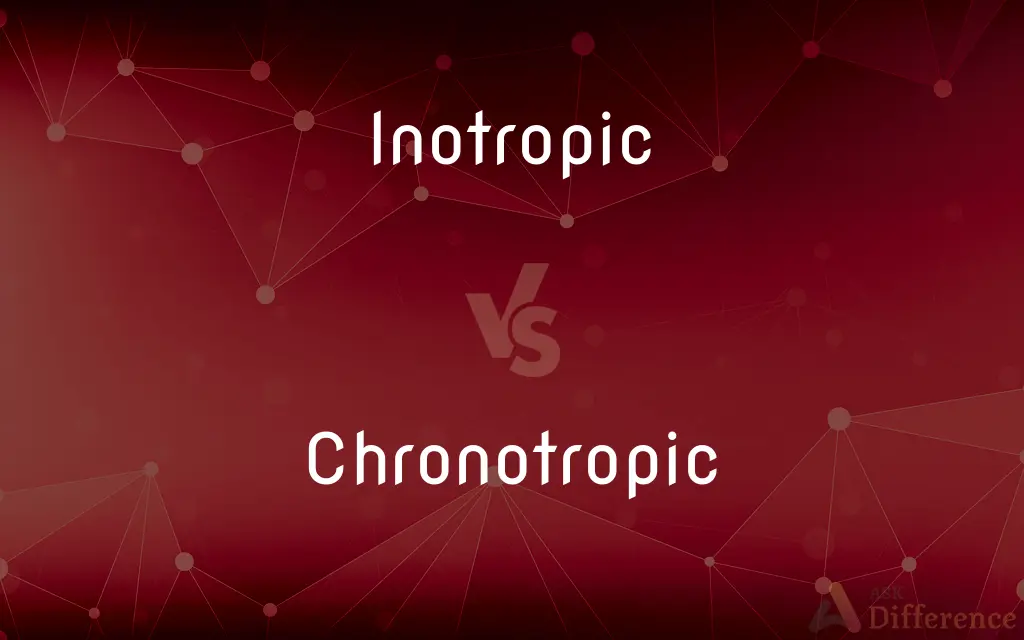Inotropic vs. Chronotropic — What's the Difference?
By Tayyaba Rehman — Published on September 23, 2023
Inotropic effects alter the force of heart contractions, while chronotropic effects change the heart rate. Inotropic focuses on strength; chronotropic on timing.

Difference Between Inotropic and Chronotropic
Table of Contents
ADVERTISEMENT
Key Differences
The terms "Inotropic" and "Chronotropic" are predominantly used in the field of cardiology and relate to the heart's functionality. An inotropic effect pertains to the change in the strength or force of the heart's contractions. In contrast, a chronotropic effect is about the change in the heart rate, especially in terms of its speed.
When discussing medications or interventions that have an inotropic effect, it means they influence the force with which the heart muscles contract. So, positive inotropic agents enhance the heart's force of contraction, and negative inotropic agents diminish it. On the other side, chronotropic effects delve into the rate of the heartbeats. Positive chronotropic agents speed up the heart rate, while negative ones slow it down.
It's worth noting that while inotropic effects center on the power and vigor of heart contractions, chronotropic effects are about the rhythm and pacing. The heart's ability to pump blood efficiently is affected by both these aspects. A balance between inotropic and chronotropic effects ensures that the heart functions optimally.
Many factors can have inotropic and chronotropic effects, from medications to autonomic nervous system influences. For instance, adrenaline, when released, exhibits a positive inotropic and chronotropic effect, enhancing both the heart's force of contraction and its rate.
In summary, while both inotropic and chronotropic effects are crucial to heart functionality, they cater to different aspects: inotropic to strength and force, and chronotropic to rhythm and rate.
ADVERTISEMENT
Comparison Chart
Definition
Relates to force of heart contractions
Relates to heart rate
Positive Effect
Strengthens heart contractions
Increases heart rate
Negative Effect
Weakens heart contractions
Decreases heart rate
Biological Examples
Effects of calcium on heart muscles
Effects of autonomic nervous system on heart rate
Associated Medications
Digoxin (positive inotropic)
Atropine (positive chronotropic)
Compare with Definitions
Inotropic
Related to altering the contractility of heart muscles.
The inotropic influence of the drug was evident in improved cardiac output.
Chronotropic
Pertaining to the rate of heart contractions.
Beta-blockers have a negative chronotropic effect, reducing the heart rate.
Inotropic
Focused on the strength and power of heartbeats.
Inotropic agents are crucial in managing certain heart conditions.
Chronotropic
Influencing the speed or frequency of heart rhythms.
Exercise has a positive chronotropic impact, raising the heart rate.
Inotropic
Pertaining to the force of heart contractions.
Some medications have a positive inotropic effect, enhancing heart strength.
Chronotropic
Related to altering the rhythm of heartbeats.
The chronotropic effect of the medication was evident in the patient's slower heart rate.
Inotropic
Referring to the modification of the heart's contractile force.
The inotropic response of the myocardium was studied using various stimuli.
Chronotropic
Referring to the modification of the heart's rhythmic rate.
Studying chronotropic responses helps understand heart rate variability.
Inotropic
Influencing the vigor of heart muscle contractions.
Heart failure patients might require inotropic support to improve heart function.
Chronotropic
Concerned with the pacing and timing of heart contractions.
Chronotropic agents can either speed up or slow down heart rhythms.
Inotropic
Affecting the contraction of muscle, especially heart muscle
An inotropic drug.
Chronotropic
Chronotropic effects (from chrono-, meaning time, and tropos, "a turn") are those that change the heart rate. Chronotropic drugs may change the heart rate and rhythm by affecting the electrical conduction system of the heart and the nerves that influence it, such as by changing the rhythm produced by the sinoatrial node.
Inotropic
(physiology) Increasing or decreasing the force of muscular contractions.
Chronotropic
(physiology) Of, relating to, or affecting the rate of muscular contraction, especially of the heart.
Inotropic
An inotropic heart drug.
Common Curiosities
What does a positive inotropic effect mean?
A positive inotropic effect strengthens or enhances heart muscle contractions.
What does a negative chronotropic effect imply?
A negative chronotropic effect implies a reduction or slowing down of the heart rate.
What does "Inotropic" primarily relate to?
"Inotropic" primarily pertains to the force or strength of heart contractions.
How does "Chronotropic" influence the heart?
"Chronotropic" effects influence the rate or rhythm of the heartbeats.
What's an example of a medication with inotropic properties?
Digoxin is a known medication with positive inotropic properties.
Can chronotropic effects affect overall heart health?
Yes, extreme or abnormal chronotropic effects can lead to arrhythmias or other heart issues.
Can a substance have both inotropic and chronotropic effects?
Yes, substances like adrenaline can exhibit both inotropic and chronotropic effects on the heart.
Are there natural ways to influence inotropic effects?
Yes, substances like calcium can naturally influence inotropic effects in the heart.
How are chronotropic effects influenced by exercise?
Exercise generally induces a positive chronotropic effect, increasing the heart rate.
Are inotropic effects always beneficial?
Not necessarily. While positive inotropic effects can help in heart failure, excessive force can harm the heart.
How are inotropic and chronotropic effects studied?
They're studied using ECGs, heart monitors, and other diagnostic tools.
How do inotropic effects relate to blood pressure?
Stronger inotropic effects can lead to increased blood pressure due to more forceful contractions.
What bodily system influences chronotropic effects?
The autonomic nervous system, especially the sympathetic and parasympathetic systems, influences chronotropic effects.
What happens during a negative inotropic effect?
During a negative inotropic effect, the force of heart contractions is weakened.
Can chronotropic effects be influenced by stress?
Yes, stress can induce a positive chronotropic effect, increasing the heart rate.
Share Your Discovery

Previous Comparison
Dietitian vs. Nutritionist
Next Comparison
Equity vs. ShareAuthor Spotlight
Written by
Tayyaba RehmanTayyaba Rehman is a distinguished writer, currently serving as a primary contributor to askdifference.com. As a researcher in semantics and etymology, Tayyaba's passion for the complexity of languages and their distinctions has found a perfect home on the platform. Tayyaba delves into the intricacies of language, distinguishing between commonly confused words and phrases, thereby providing clarity for readers worldwide.
















































